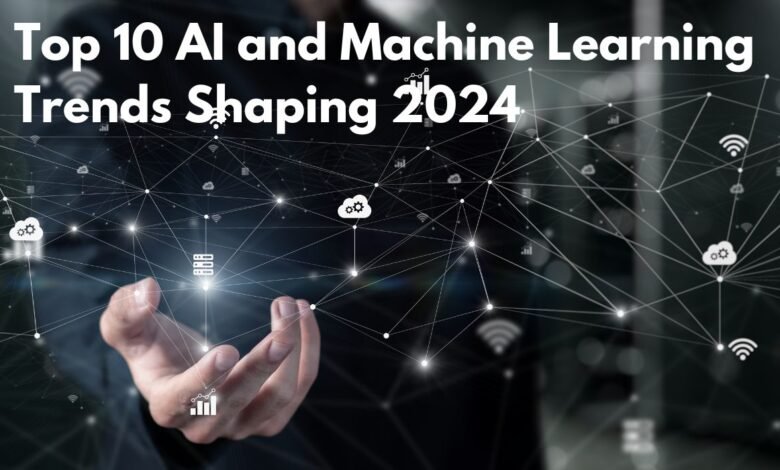Top 10 AI and Machine Learning Trends Shaping 2024
The future is here! Explore the top 10 AI & Machine Learning trends for 2024, transforming everything from healthcare to self-driving cars.

Artificial Intelligence (AI) and Machine Learning (ML) have become integral components of the modern technological landscape. These technologies are not only transforming industries but also redefining how we live and work. AI refers to the simulation of human intelligence processes by machines, particularly computer systems, while ML is a subset of AI that involves the development of algorithms that allow computers to learn from and make decisions based on data.
The significance of staying abreast of AI and ML trends cannot be overstated. As these technologies evolve at a breakneck pace, they bring forth new opportunities and challenges. For businesses and individuals alike, understanding these trends is crucial to remain competitive and innovative. Rapid advancements in AI and ML have led to groundbreaking developments that impact various sectors, including healthcare, finance, and entertainment.
In healthcare, AI-driven diagnostics and personalized treatment plans are revolutionizing patient care. Financial institutions leverage machine learning algorithms to detect fraud and automate trading. Meanwhile, the entertainment industry utilizes AI to enhance user experiences through recommendation systems and content creation. By keeping up with the latest trends in AI and ML, organizations can harness these advancements to improve efficiency, reduce costs, and deliver superior products and services.
Moreover, emerging trends in AI and ML often signal broader shifts in technology and society. For instance, the increasing integration of AI in everyday devices and the growth of edge computing are indicative of a move towards more decentralized and intelligent systems. Additionally, ethical considerations and regulatory frameworks surrounding AI are evolving, underscoring the importance of responsible AI development and deployment.
In this blog post, we will delve into the top 10 AI and ML trends for 2024, examining how they are poised to shape the future. By understanding these trends, stakeholders can better navigate the complexities of the digital era and leverage AI and ML to drive innovation and growth.
AI and Machine Learning Trends
AI in Healthcare
One of the foremost trends in AI and machine learning for 2024 is the continued integration of AI in healthcare. This development promises to revolutionize medical diagnostics and treatment plans. AI algorithms can analyze vast amounts of data to identify patterns that may be missed by human practitioners, leading to improved diagnostics. Additionally, AI can assist in creating personalized treatment plans tailored to individual patient needs, enhancing the efficacy of medical interventions. The implications of AI in healthcare include reduced diagnostic errors, faster patient recovery times, and optimized resource allocation in medical facilities.
Natural Language Processing (NLP)
Natural Language Processing (NLP) is set to make significant strides in 2024, with applications spanning various industries. Enhanced customer service through AI-powered chatbots and virtual assistants will become more intuitive, offering seamless interactions and prompt responses. NLP improvements will also facilitate better sentiment analysis, enabling businesses to gauge customer satisfaction more accurately. Moreover, advanced NLP can translate languages more effectively, breaking down communication barriers in global enterprises. These advancements in NLP will lead to more efficient customer service operations and richer, more dynamic user experiences.
AI Ethics
As AI technologies become more pervasive, the focus on AI ethics is intensifying. In 2024, there will be a greater emphasis on ethical considerations and bias reduction in AI systems. Companies and developers will be tasked with ensuring that their AI models are transparent, fair, and free from discrimination. This trend will involve implementing robust frameworks for ethical AI governance and conducting regular audits to identify and rectify biases. The potential applications of ethical AI include more equitable hiring practices, unbiased loan approval systems, and fairer judicial decisions, fostering trust and accountability in AI deployments.
Edge AI
Edge AI is another key trend, characterized by the deployment of AI technologies on edge devices for real-time data processing. In 2024, the use of Edge AI will expand across various sectors, enhancing the performance of Internet of Things (IoT) devices and reducing latency in data processing. This trend is particularly significant for industries requiring real-time decision-making, such as manufacturing, transportation, and smart cities. Edge AI enables more efficient data management, improved security, and reduced reliance on cloud-based systems, leading to faster and more reliable operations.
Autonomous Vehicles
Advancements in autonomous vehicle technology are anticipated to be a major highlight in 2024. Enhanced AI algorithms will improve the safety and reliability of self-driving cars, making them a viable option for mainstream adoption. These advancements include better object recognition, more accurate navigation systems, and improved decision-making capabilities in complex traffic scenarios. The potential applications of autonomous vehicles extend beyond personal transportation to include logistics, public transport, and emergency response services. The development of autonomous vehicles will lead to reduced traffic accidents, lower transportation costs, and increased mobility for individuals who are unable to drive.
Trend 6: AI in Cybersecurity
Artificial intelligence is increasingly being leveraged in the realm of cybersecurity to enhance threat detection and implement proactive defense mechanisms. AI systems can analyze vast amounts of data to identify patterns that may signify a potential threat, enabling quicker responses to cyber-attacks. Machine learning algorithms are particularly useful for distinguishing between normal and anomalous behavior, thereby reducing false positives and improving the overall efficiency of cybersecurity operations. The potential benefits include enhanced security protocols, reduced risk of data breaches, and a more robust defense against evolving threats.
Trend 7: Quantum Computing and AI
Quantum computing is expected to revolutionize AI by offering exponentially faster data processing capabilities. This synergy can solve complex problems that are currently beyond the reach of classical computers. Quantum algorithms can enhance machine learning models, making them more accurate and efficient. This collaboration can lead to significant advancements in fields such as cryptography, drug discovery, and financial modeling. The integration of quantum computing with AI promises not only faster computational speed but also the ability to tackle problems previously deemed insurmountable.
Trend 8: AI in Finance
The financial sector is increasingly adopting AI to improve operations and customer experience. AI-driven systems offer enhanced fraud detection by identifying unusual transactions in real-time, thereby mitigating risks. Additionally, AI provides personalized financial advice to customers by analyzing their spending habits, investment portfolios, and financial goals. The use of chatbots and virtual assistants powered by AI further enhances customer service, offering instant support and personalized recommendations. Overall, AI contributes to more secure, efficient, and customer-centric financial services.
Trend 9: AI for Environmental Sustainability
AI is playing a critical role in promoting environmental sustainability. Predictive analytics powered by AI helps in efficient resource management, such as optimizing water usage in agriculture or reducing energy consumption in smart grids. AI models are also employed for climate change modeling, enabling scientists to predict and mitigate the impacts of environmental changes. The potential benefits include more sustainable resource utilization, reduced carbon footprints, and better preparedness for environmental challenges. AI thus serves as a powerful tool in the global effort towards sustainability.
Trend 10: AI in Entertainment
The entertainment industry is undergoing a transformation with the integration of AI, resulting in more immersive and personalized experiences for users. AI algorithms are employed to curate content recommendations based on individual preferences, enhancing user satisfaction. In the realm of gaming, AI enables the creation of more realistic and interactive virtual environments. Additionally, AI-driven tools assist in content creation, such as scriptwriting and video editing, thereby streamlining production processes. The benefits include enriched user experiences, increased engagement, and innovative content delivery methods.
- Turn Your iPhone into a 3D Product Studio (Doly App)
- WhatsApp could soon allow users to select different chat themes: Here’s how it will work
- Engagement on Autopilot: How Meta AI Can Elevate Your Facebook Presence
Conclusion and Future Outlook
As we have explored throughout this blog post, the advancements in AI and machine learning are shaping numerous industries and revolutionizing the way we interact with technology. From the rise of ethical AI and explainable AI to the integration of machine learning in cybersecurity and healthcare, these trends are setting the stage for a transformative future. The increasing emphasis on AI regulation, the fusion of AI with IoT, and the growing capabilities of natural language processing are further evidence of the significant impact these technologies will have.
It is crucial for businesses and professionals to stay informed about these trends to harness their full potential. By understanding and anticipating these changes, organizations can better position themselves to capitalize on new opportunities and mitigate potential challenges. Staying updated on AI and machine learning trends will enable individuals and companies to remain competitive in an ever-evolving technological landscape.
Looking beyond 2024, we can expect AI and machine learning to continue evolving at a rapid pace. Innovations in quantum computing, advancements in autonomous systems, and the further democratization of AI tools and technologies are likely to be key developments. As these technologies become more accessible, their integration into various sectors will become even more profound, driving efficiency, enhancing decision-making processes, and creating new business models.
To keep abreast of these developments, it is advisable to engage with a variety of resources. Subscribing to industry newsletters, attending conferences and webinars, and following thought leaders on social media platforms are excellent ways to stay updated. Continuous learning and adaptation are essential in navigating the dynamic field of AI and machine learning successfully.
Future of AI and machine learning promises unprecedented opportunities and challenges. By staying informed and proactive, you can leverage these technologies to their fullest potential, ensuring sustained growth and innovation in the years to come.



